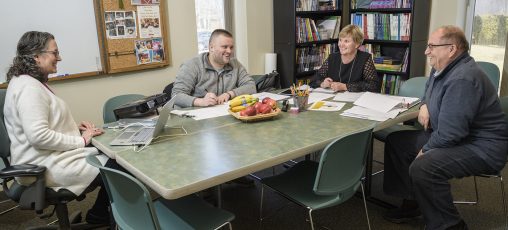
From left: Pam Everly, Wesley Livesay, Jeannette Horwitz and Herb Lohrberg work on a marketing plan for LEAP’s English pronunciation course. (Photo by Erin Pence)
Wright State University’s LEAP Program didn’t have to look far when it wanted help marketing its English pronunciation courses to locals who hail from foreign countries. It was just a matter of going next door.
As part of a Small Business Marketing Planning course, students at the Raj Soin College of Business are helping develop a marketing plan for LEAP, the Learning English for Academic and Professional Purposes Intensive English Program that operates out of adjacent Allyn Hall.
“The students are going to focus on marketing ‘LEAP for Locals,’ reaching out to the population in the region who are English-as-a-second-language speakers and may be interested in taking a class or two to improve their skills,” said Jeannette Horwitz, director of LEAP. “It’s a win-win for all because we get some help with marketing and the students get experience working with an authentic organization.”
Wright State’s LEAP Program provides full-time and part-time English instruction and helps non-native speakers develop the linguistic, academic and social skills they need to be successful. LEAP offers six-week pronunciation classes to students and community members three times a year.
“We want to try to market it more to the community,” said Horwitz. “Previously, we tried to spread the word about the courses through our personal contacts in the community. We want to expand that. The trick is how do people in the community find us?”
Pam Everly, an adjunct instructor in the LEAP Program, said sometimes the pronunciation class fills up and other times it doesn’t.
“We’re not sure exactly why the enrollment is so uneven,” said Everly. “That’s why we’re working with the marketing class. We wanted to find out what factors influenced people’s decisions to enroll or not to enroll.”
LEAP reached out to the College of Business and was assigned one of the five-member marketing teams. Bert Kollaard, an adjunct marketing and management instructor who teaches the class, felt the project was a good fit for his students because LEAP is like a small business that has a product to sell.
The business course pairs student teams up with companies and organizations to help them with marketing. In a similar class project a few years ago, graduate accounting students worked for not-for-profit groups that help needy children, teens, businesses and others.
Kollaard is a strong proponent of integrating hands-on, practical learning opportunities into the curriculum.
“It’s a great opportunity for students to apply and showcase their talent and capabilities in a real-life setting, generate visibility for the university and help small businesses and organizations with projects and initiatives that might otherwise be cost prohibitive,” he said.
The marketing team meets with Horwitz and Everly weekly to discuss the marketing plan and extensive secondary research to assess the current market situation, dynamics and opportunity. The students are developing a survey that will be distributed to potential students in the community, asking them such things as why they would or wouldn’t take the course. The goal is to come up with the marketing plan for LEAP by the end of the semester.
Finance major Herb Lohrberg and marketing major Wesley Livesay met recently with Horwitz and Everly to present them with a proposed survey of prospective students, fine-tune the questions and get their feedback. They discussed what questions and information should be on the survey, such as the cost of the course as well as whether the students have visas, whether they would have transportation to Wright State and whether they might be interested in additional courses.
The group also discussed ways to identify new sources of potential students. LEAP works with departmental contacts, the University Center for International Education newsletter, the Air Force Institute of Technology and Welcome Dayton, a community initiative that promotes immigrant integration into the region.
There was also talk of whether financial incentives should be used to get people to take the survey and whether there might be scholarship money available in the community to help students take the course. Also discussed was whether to include LEAP’s mission statement in the survey and whether LEAP should develop a marketing vision statement.
“They’ve just been real enthusiastic,” Everly said of the business students. “They come to LEAP events. They get to know the students. They are very involved.”

 Wright State medical students bring medicine to life for Mini University preschoolers
Wright State medical students bring medicine to life for Mini University preschoolers  Wright State Theatre to present rom-com musical ‘The Wedding Singer’
Wright State Theatre to present rom-com musical ‘The Wedding Singer’  Heavy metal learning
Heavy metal learning  State grants to bolster Wright State’s electric vehicle and advanced manufacturing training for students
State grants to bolster Wright State’s electric vehicle and advanced manufacturing training for students  Wright State partners with local universities, hospitals to expand mental health care for students
Wright State partners with local universities, hospitals to expand mental health care for students 